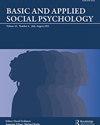Does Repetition Always Make Perfect? Differential Effects of Repetition on Learning of Own-Race and Other-Race Faces
IF 1.8
3区 心理学
Q2 PSYCHOLOGY, SOCIAL
引用次数: 3
Abstract
Abstract People have a remarkable capacity to process and recognize faces. Yet, they fail to recognize the faces of individuals from other racial groups - the Other-Race Effect (ORE). We investigated the role of repetition - a powerful determinant of learning and memory - in reducing the ORE. We predicted that repetition would improve face learning, particularly for other-race faces, as these are poorly learned based on a single presentation. Because own-race faces are easily learned based on a unique presentation, they should benefit less from repetition. We tested this hypothesis across five experiments. Results showed that repetition not only did not reduce the ORE, but instead, it increased it. We discuss the theoretical implications of these findings for the ORE.重复总是完美的吗?重复对本种族和其他种族面孔学习的差异效应
人类具有非凡的处理和识别面孔的能力。然而,他们无法识别来自其他种族群体的人的面孔-其他种族效应(ORE)。我们研究了重复的作用——学习和记忆的一个强大的决定因素——在减少ORE方面的作用。我们预测重复会提高面孔学习,特别是对其他种族的面孔,因为这些面孔是基于单一的呈现而学习的。因为自己种族的面孔很容易通过独特的呈现来学习,所以他们从重复中获益较少。我们通过五个实验验证了这个假设。结果表明,重复不仅没有降低ORE,反而增加了ORE。我们讨论了这些发现对矿石的理论意义。
本文章由计算机程序翻译,如有差异,请以英文原文为准。
求助全文
约1分钟内获得全文
求助全文
来源期刊

Basic and Applied Social Psychology
PSYCHOLOGY, SOCIAL-
CiteScore
4.50
自引率
12.50%
发文量
7
期刊介绍:
Basic and Applied Social Psychology (BASP) emphasizes the publication of outstanding research articles, but also considers literature reviews, criticism, and methodological or theoretical statements spanning the entire range of social psychological issues. The journal will publish basic work in areas of social psychology that can be applied to societal problems, as well as direct application of social psychology to such problems. The journal provides a venue for a broad range of specialty areas, including research on legal and political issues, environmental influences on behavior, organizations, aging, medical and health-related outcomes, sexuality, education and learning, the effects of mass media, gender issues, and population problems.
 求助内容:
求助内容: 应助结果提醒方式:
应助结果提醒方式:


